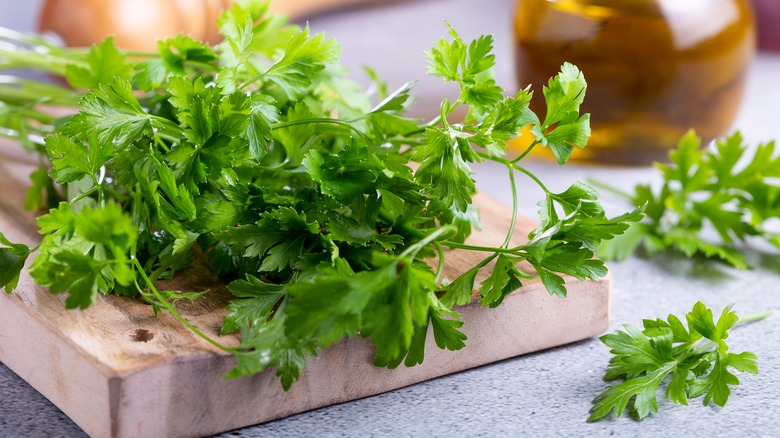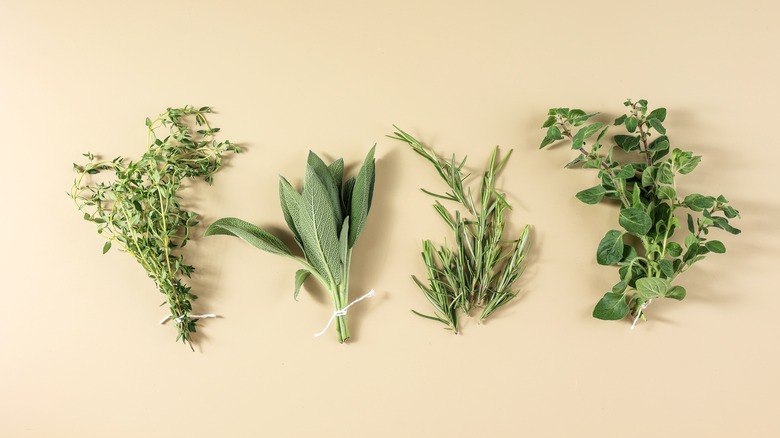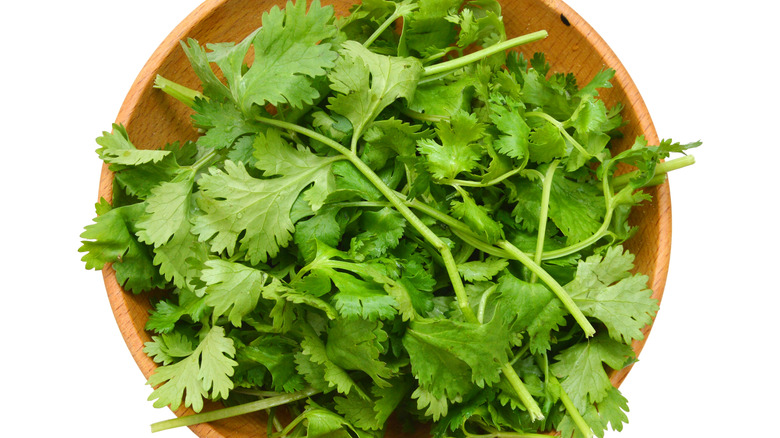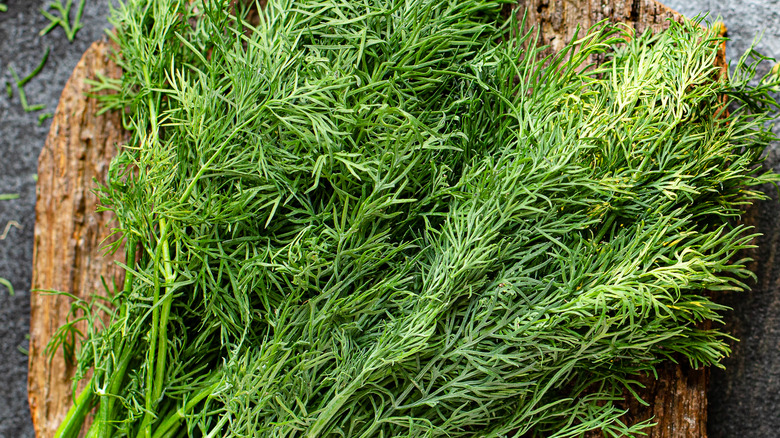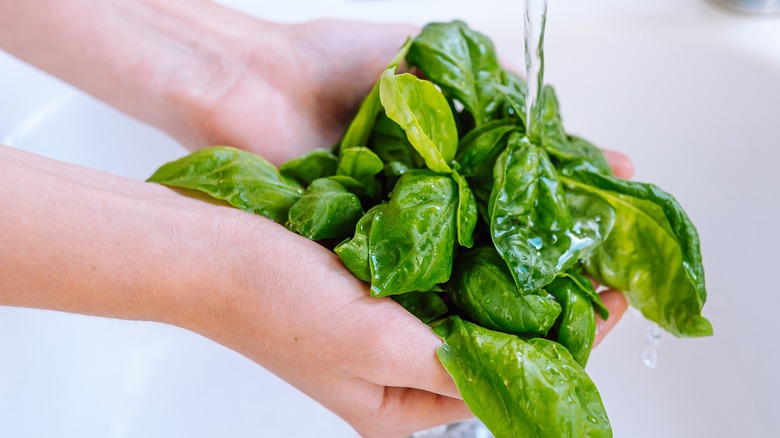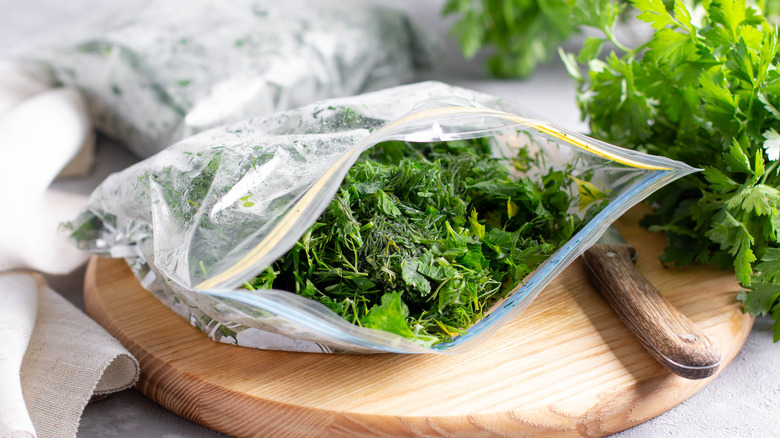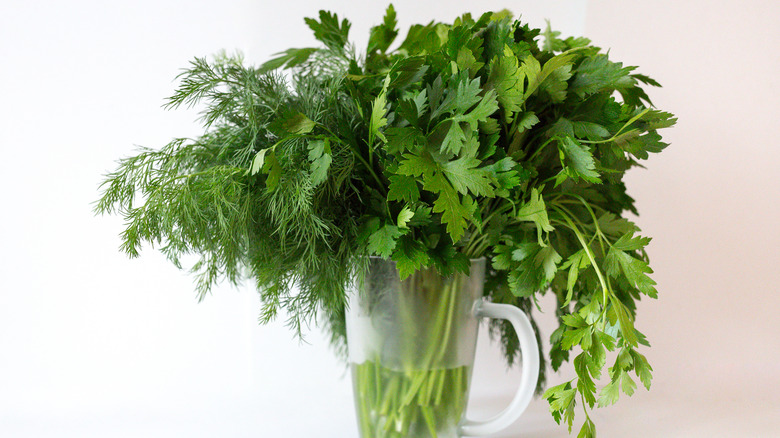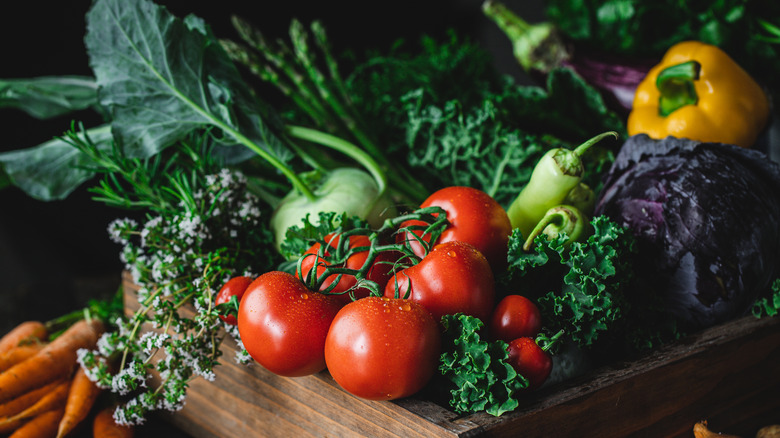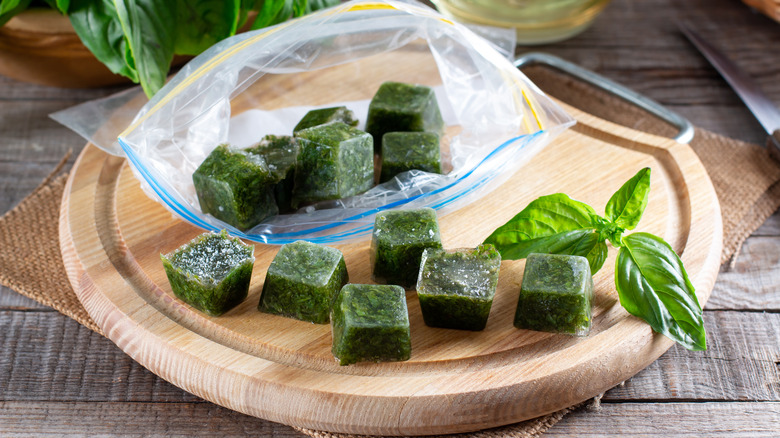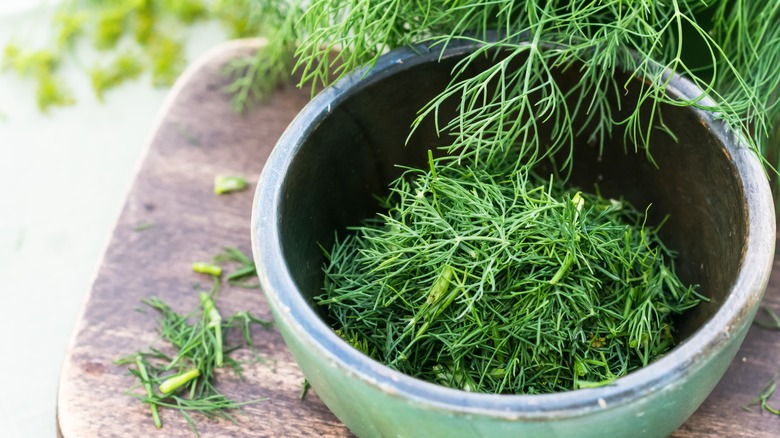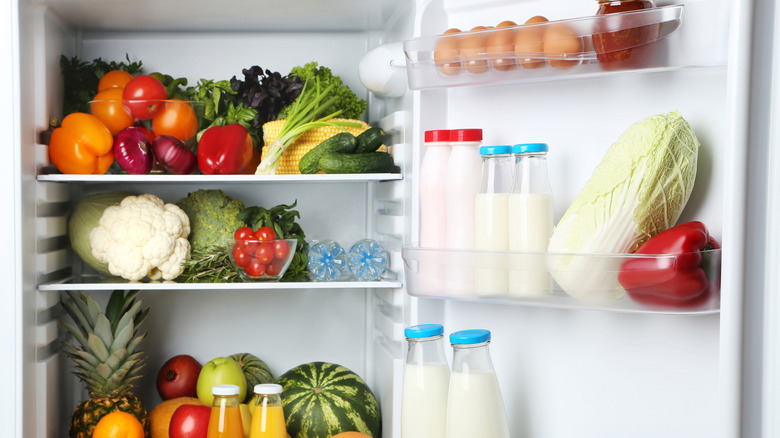Mistakes Everyone Makes When Storing Herbs
Fresh herbs are often the underrated heroes of the culinary world. Adding the aromatic fragrance of fresh basil or thyme can transform a dish from ordinary to delectable while also adding a burst of vibrant color. For this reason, many home cooks like to keep a bunch of fresh herbs nearby to make sure their dish-elevating power is never out of reach. But there is a catch — fresh herbs are pretty delicate things. In fact, basil gets bruised just by chopping it! If not stored correctly, herbs can lose their potent flavor and rich color within a few days.
Whether we're not prepping them properly before freezing or simply choosing the wrong container to keep them in, we have all made mistakes when storing herbs. And that means we have all experienced the disappointment of reaching for a bunch of cilantro only to be greeted by a wilted, slimy mess. Don't give up on using herbs, though, as with a few longevity tips, you'll be able to keep them looking green and tasting great for much longer than you are used to. Join us as we explore the most common mistakes people make when storing herbs and what you can do instead to keep them looking and tasting fresh for as long as possible.
Treating all herbs the same
The first mistake people often make when looking after their herbs is to assume there is a one-size-fits-all approach to storing them and increasing their lifespan. While all herbs have a number of things in common, they are not identical; herbs fall into two distinct categories that cannot necessarily be treated in the same way.
Herbs with delicate leaves, such as basil, cilantro, and parsley, are known as tender or soft herbs. They have a shorter shelf life and are more likely to wilt or spoil if not stored correctly. They are sensitive to light and heat, so keeping them cool and out of direct sunlight is crucial to increase their longevity.
Woody or hard herbs, on the other hand, are much more robust and can withstand certain conditions without spoiling. Thyme, rosemary, and oregano can survive for two weeks in the fridge, especially if wrapped in a damp paper towel, as they prefer to be kept moist.
Whichever type you have, it's important to keep different herbs separate when storing them. While you may love the fragrant aromas of all the herbs you buy, storing them together can cause one herb to overpower the other in terms of flavor, meaning that your tarragon-flavored dish may end up decidedly thyme-infused instead. Treat each herb as a separate ingredient in your fridge to ensure the precious flavor molecules don't become entangled with each other.
Not using airtight containers
Though the most convenient way to store your herbs in the fridge is to simply lay them on a shelf in the packaging they came in, this is a surefire way to guarantee black, wilted herbs within a day or two. Fresh herbs are sensitive to many different conditions, so sealing them in an airtight container is the best way to prevent exposure to air, moisture, and light.
Oxidation will cause your herbs to turn brown or black, so keeping them away from oxygen in the air should prevent this from happening. A plastic or glass container with an airtight lid is the best option. With soft herbs, such as mint or tarragon, they can be affected by either too much moisture or too little — they are very much the Goldilocks of the plant world! Too much moisture will cause them to become slimy, whereas if they are too dry, they will start to wilt. Keeping them sealed will keep the moisture levels close to what they need.
Woody herbs benefit from some moisture, so storing them in a compartment with low humidity could cause them to wilt prematurely. To avoid this, wrap your rosemary or thyme in a damp paper towel before sealing the container to make sure they have access to the moisture that will keep them fresh.
Freezing fresh herbs without preparing them first
When looking for hacks on how to store your fresh herbs, one common tip is to freeze them as soon as you buy them, preventing them from spoiling before you are able to use them. This is definitely a great tip, but the herbs require some preparation first to make sure you get the most out of them.
When you buy herbs from the supermarket or pick them from your garden, they have a high moisture content, particularly tender herbs like basil and parsley. If you freeze them in the flimsy plastic bag they came in, ice crystals are likely to form on the surface of the leaves, damaging the delicate structure of the cells. This will lead to a soggy green mess when you defrost them, rather than the vibrant, aromatic herbs you started with.
The best way to prevent ice crystals from forming is to store herbs in a plastic or glass freezer-safe airtight container. If you don't have space for this, wrap them tightly in a cloth or plastic bag, sealing it well to protect the delicate leaves.
Leaving herbs wet after you wash them
Some people like to wash their fresh produce before freezing to remove dirt particles and bacteria. Of course, whether they're homegrown or from the grocery store, washing herbs is an important step before cooking too; we've all heard about reported illnesses and hospitalizations due to contaminated herbs, such as basil, cilantro, and parsley, from bacteria, including E.coli. Although these occurrences may be rare, it's not worth taking a risk with your health, so washing all fresh produce before eating is a crucial measure. However, this will increase the moisture content even further. Delicate herbs don't cope well with too much water, so drying them off afterward is essential.
Be sure to dry the leaves thoroughly before freezing or storing in the fridge. A salad spinner is the most effective way to dry your herbs after washing, removing most of the excess moisture from them. Failing that, you can air dry them on a paper towel to absorb as much water as possible. This way, you can be reassured that your herbs are unlikely to be harboring any dangerous bacteria without them turning into a soggy pile of mush in your fridge.
Using regular plastic bags
Using a plastic bag to store fresh herbs in either the fridge or the freezer can be a good idea because sealing them against air and moisture will help them to stay fresh for longer. But regular plastic bags could make the herbs sweat, meaning they are more likely to degrade in quality. A great alternative to plastic bags is to use a cotton drawstring bag to store your herbs instead. The natural material will allow the herbs to breathe a little and reduce the chance of condensation buildup compared to plastic.
Beeswax or cotton waxed bags are other options that can replace plastic wrap in general if you prefer plastic-free options. If you're looking for a novel way to keep all of your produce fresh for longer, not just your herbs, Australian company The Swag has just the thing. The product is a three-layered cotton bag designed to allow produce the correct amount of hydration to keep it fresh much longer than your usual containers. The company ships worldwide, so if you're serious about reducing plastic waste and food waste at the same time, it may be worth checking out the bags.
Not storing herbs in water
Because herbs can dry out and wilt so quickly, it's a mistake to not use every tactic you have to control moisture. An easy way to increase the longevity of your fresh herbs is to treat them like a bouquet of flowers. When you bring the herbs home, remove them from the plastic packaging and cut the ends to make them the same size. Then put them in a glass or plastic container with a little water in the bottom, just as you would arrange flowers in a vase. This allows the plants to access water through the stems whenever they need it, and it protects the leaves from becoming wet. Covering the tops of the herbs with an upside-down zip top bag can help protect them from getting bumped as you rearrange other items in the fridge.
If you're concerned about knocking over the 'vase' in the fridge, an upright plastic tub with a lid can work, too, as long as you make sure the leaves are not submerged in the water. The biggest drawback of this method is the space it takes up in the fridge, but if you have plenty of room, it's one of the best ways to keep your herbs fresh for longer.
Storing herbs near tomatoes or bananas
When arranging fruits and vegetables in your kitchen, one thing you may not have considered is keeping certain produce away from tomatoes and bananas. Why these two fruits, you may wonder? It's all to do with gas. Both tomatoes and bananas are producers of ethylene, a gas that has the ability to ripen fruits and vegetables. While this is a handy tip to know when you have an avocado that is rock solid and you want to use it, it's not good news for produce that is ethylene sensitive, including fresh herbs.
Although all herbs will ripen more quickly in the presence of ethylene, parsley, marjoram, and mint suffer particularly badly. To avoid them over-ripening, try to keep your herbs and other ethylene-sensitive foods well away from tomatoes and bananas. If this is impossible, wrapping the banana stalks with either plastic wrap or aluminum foil can reduce the amount of ethylene gas that is emitted. This simple precaution means you can keep your herbs fresher for longer and leave the ethylene-producing fruit to help ripen other produce instead.
Not making use of the ice cube tray
Most home cooks would love to have a variety of fresh herbs on hand every day to add to our culinary masterpieces, but this is not always possible. That said, if you've got an ice cube tray that you're not using, you're missing out on a big opportunity. One great trick is to create tiny portions of chopped herbs that can be added to sauces, stews, and soups whenever you need them by freezing fresh herbs and oil in ice cube trays.
After washing your herbs, chop them finely and spread them out in the compartments of an ice cube tray. If you have a selection of fresh herbs, you can add different ones to each compartment, as once frozen, the herbs are less likely to impart flavor to each other. Then top up each compartment with some olive oil and put they tray in the freezer. Soon you'll have perfect flavor-packed cubes to reach for whenever you need to add a bright taste to your dishes. Freezing the herbs at their peak freshness means their aroma will be intact, ready to lift the flavor of your curry or stew. While the texture may not be quite the same as when it was fresh, this is not important when adding to a sauce. So next time you have a big bunch of fresh herbs, make yourself some flavorful ice cubes to have on hand in the future.
Storing herbs in direct sunlight
Though direct sunlight is perfect for growing herbs in your garden, once they've been cut it's best to keep them somewhere darker whenever possible. When exposed to excess sunlight, fresh herbs, particularly tender herbs, are likely to turn yellow due to the green pigment chlorophyll becoming damaged.
As well as looking worse for wear, the yellow leaves will lose their vibrant flavor, meaning herbs that have been left in the sun for a few days will not have the distinctive aroma and flavor they're known for. To keep your herbs fresh, keep them in a cool, dark spot where sunlight will not reach them. A cupboard or pantry is ideal, or if you need to store them on the countertop, consider using one of those cotton bags designed for fresh produce. This breathable cover can help protect your herbs from the effects of sunlight just as well as it does for air and moisture. By keeping your fresh herbs in as dark a spot as possible, you cut down on food waste and make sure your herbs retain their vibrant color and delicious aroma.
Forgetting your herbs are in the fridge
We've all been there — you buy a huge bunch of your favorite herb, planning to make a beautiful casserole for dinner, but then life gets in the way, and your inspired gastronomic creation gets put on hold. Fast forward a week or so, and you find your once-vibrant fresh herbs in a slushy pile at the back of the fridge. Many of us cram so much into our fridges that things can get neglected at the back, destined to go straight to the compost heap without fulfilling their culinary potential. To avoid this travesty, think carefully about where to store your herbs when you're preparing them for the fridge. If you're using bags or containers, consider labeling them and adding a date so that you can see at a glance exactly what is inside and how long it has been there.
Remember that no matter how many of these tips you learn for keeping herbs fresh, it will all be in vain if you don't actually use them. By adopting a more mindful approach to storing your herbs (and other produce), your kitchen will feel more organized, and fewer of your herbs will be wasted. This means you will always have some at hand ready to add a zingy burst to your next gourmet delight.

